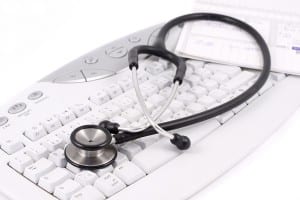
What Are the Advantages of EMR Software?
Electronic medical record software has changed the face of the medical industry as we know it, but what are the advantages of EMR?
According to the Centers for Disease Control and Prevention (CDC), 85.9% of office-based physicians use electronic medical records (EMR) systems.
Why are electronic medical records so popular? What are the advantages of EMR? Why are electronic records better than paper records? What are the most popular EMR systems?
What Is the Purpose of EMR?
EMR systems keep an ongoing electronic record of a patient's care. As such, EMR systems replace the physical “chart” health care professionals traditionally used to log diagnoses, treatments, and other records.
With an EMR system in place, clinicians and staff use computer software to create, manage, and consult patient records. With an EMR system, moreover, they are able to do so instantaneously and at the point of care.
What Are the Advantages of EMR?
The goal of any health care system is to provide quality patient care. Various factors influence the quality of care, and EMR systems, in turn, impact many of these factors.
EMR Enhances Clinical Decision-Making
EMR systems allow health care providers access to the entirety of a patient's records. Importantly, they allow this access at the point of care. This means that a doctor who is deciding on a current course of treatment can integrate all past diagnoses and treatments—including from other providers—into the decision at hand.
EMR Reduces Medical Errors
Two common sources of medical errors are illegible handwriting and transcription errors. Looking at medication errors alone, these two causes are responsible for up to 61% of hospital mistakes.
Studies show that EMR systems reduce these errors. First, they eliminate providers' reliance on handwritten records. In addition, some EMR systems even use a series of questions to guide providers through the prescription process. During this process, EMR systems can flag potential allergies and interactions based on a patient's history.
The advantages of EMR in hospitals on this measure alone is significant. In fact, the hospitals with the most errors before adopting an EMR system show the greatest improvements.
EMR Enhances Communication and Saves Time
EMR systems reduce the barriers to communication between the referring physician, on one hand, and specialists, labs, and other providers, on the other. To request an X-ray or bloodwork, for example, a doctor simply places an electronic order. The lab receives the order immediately, and once the order is completed, it sends an electronic report back to the doctor.
This efficient process saves overworked providers valuable time. It also means patients have quicker access to potentially life-saving treatment.
EMR Facilitates a Patient-Centered Approach to Care
EMR systems allow providers and staff easy access to a patient's record of care. However, they also allow patients to access their own records. Having access to their records enables patients to take an active role in their care.

Armed with information, patients can prepare for visits and ask questions. They can reference a provider's notes while shopping for medical devices, supplements, or other complementary care elements. They can even contact their providers to schedule appointments, pose an inquiry, or refill a prescription—all from the comfort of their homes.
EMR Promotes Preventative Care
Most EMR systems allow providers to set patient care goals. They also enable providers to set alerts reminding patients when it's time to schedule preventative health care measures. If patients fail to schedule these appointments, EMR systems can alert clinicians to records that are out of date.
Studies show that increasing the use of preventative care services could save 2 million lives each year. It could also reduce health care costs by $3.7 billion.
EMR Improves the Coordination of Care
EMR systems can reduce health care costs by increasing the use of preventative care services. At the same time, EMR systems can also reduce health care costs by improving the coordination of care.
With full access to a patient's records at the point of care, providers know what measures their colleagues have already tried. As a result, they are less likely to order redundant tests and other procedures.
EMR Saves Space, Office Supplies, and Administrative Costs
EMR systems eliminate the need for paper charts. These paper charts occupy space in doctor's offices and hospitals. Over time, many providers using paper charts are forced to utilize external storage facilities to manage patient records. These facilities impose further financial costs on the health care system. In addition, they reduce access to patient information.
Keeping physical charts also requires a significant supply of paper, dividers, and folders. Switching to an EMR system eliminates the need for these supplies.
Finally, EMR reduces the burdens placed on administrative and clerical staff.

Health care systems that use paper records must employ staff transcriptionists or outsource their transcription services. In either case, resources that could be spent on patient care are diverted.
Facilities that rely on paper charts must also maintain a larger office staff to file those charts and navigate complex coding and billing procedures. Once again, EMR systems free up these resources and staff for more productive uses.
In doing so, EMR has the potential to improve the overall efficiency of the health care system. In 2019, the U.S. health care system spent $496 billion on administrative costs. Analysts suggest that this number is double the amount necessary. They also suggest that reducing these administrative costs is necessary to control health care spending.
EMR systems offer precisely these savings.
EMR Protects Patients' Sensitive Data
Another problem with the traditional paper chart is organization and security. Office staff must file paper charts, and office staff can make mistakes. They can misplace and misfile charts. The result is confusion and delayed access to information.
Misplaced charts are also a problem of data security. Perhaps an office staff member was heading to file a patient chart but is distracted along the way. She sets the chart down on the corner of her desk as she answers a question from a colleague or patient. The chart, meanwhile, remains in full view and reach of other patients who might approach the desk.
EMR systems eliminate these risks by protecting patient data with various security measures, including firewalls and encryption.
With daily or weekly backups, they also ensure that patient records are safe in the event of a fire, flood, or other disasters.
EMR Attracts Young Physicians
Growing your practice or health care system requires adding new providers. Many young doctors have encountered EMR systems in their residency programs. They've become accustomed to these systems. Simply put, they equate them with a high level of care.
As they begin their independent practice, the best young doctors look for offices and hospitals that are equipped to offer this high level of care. Utilizing EMR tells these physicians that your practice keeps up with industry best practices.
Why Is EMR Better than Paper Records?
The advantages of EMR make it an ideal replacement for paper records. EMR saves money, resources, and time. In doing so, it frees up these resources for more valuable uses.
Instead of spending hours pouring over paper charts, physicians can focus their full attention and spend more time with the patients in their care. They can research the latest best practices and technologies. And because they saved money when their practice switched to EMR, they have the financial resources to bring the best of those technologies into the office.
Paper records are a drain on a health care system's financial resources. They increase the likelihood of medical errors and thus leave doctors vulnerable to costly malpractice claims. They increase staffing requirements for transcription and filing. They require an ongoing investment in office supplies and records storage. They contribute to waste and redundant testing.
EMR systems, in contrast, eliminate or significantly reduce these costs. Plus, they realize additional cost savings by focusing on preventative care and patient engagement.
In these ways, EMR systems improve health care outcomes for all parties.
What Are Some Popular Names of EMR Systems?
You understand the advantages, and you're ready to bring EMR to your facility. So where do you begin?
When you're ready to transition to an EMR system, the first step is investigating your options. In fact, various EMR systems are available. However, all EMR systems are not equal. Furthermore, the features of one EMR system may be better suited to your facility's needs.
Capitalizing on the advantage of an EMR system requires choosing the system that's best for you.
Popular options include:
- DrChrono EMR/EHR
- Advanced EMR MD
- Allscripts
- CureMD
- Altapoint
- Praxis EMR
- Apirima
- Athena
- Cerner
- ChartLogic
As you explore these options, compare reviews and weigh each system's cost and relevant features against your needs.
Bringing the Advantages of EMR to Your Health Care Facility
The advantages of EMR are significant. EMR systems save providers and patients time and money. They enhance communication across all levels of care. They reduce medical mistakes. They improve patient engagement. They even help doctors make better clinical decisions. In each of these ways, EMR systems improve patient care and produce better health outcomes.
Enjoying these benefits at your health care facility means choosing the best EMR system for you.
As you explore your options, count on Side by Side Reviews to help. Start comparing quotes, features, and user reviews today.
Author: Hudson Piccini
Hudson Cynar, a Harvard University alumna and the owner of three prosperous enterprises, is a distinguished business consultant, author, and writer. Her expertise spans multiple business sectors, with a particular emphasis on storage containers, commercial copiers, payroll services, and medical billing software. Dedicatedly investing thousands of hours into product and service research, Hudson crafts insightful reviews to guide entrepreneurs in making informed decisions for their businesses.


